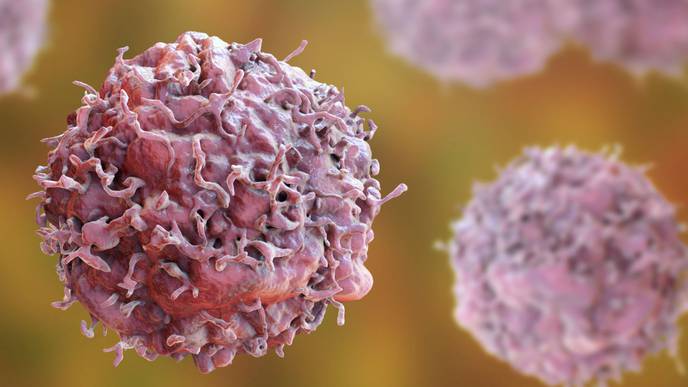ReachMD
Be part of the knowledge.™Study Uncovers How B Cells React to Melanoma

Antibody-producing B cells may be defective in responding to melanoma, a new study suggests.
The study is published in Nature Communications.
Researchers used advanced technologies to delve into the antibody immune response in blood and tissues of patients with metastatic cutaneous melanoma. The blood of patients with late-stage secondary melanoma shows significantly lower levels of mature (memory) B cells, which normally provide long-term protection from infections. This means that the antibody-producing B cells in the blood may be less able to mount effective responses against cancer.
The research also finds that active B cells accumulate at the edge of the tumor and gather in small groups. These B cells carry specific antibody features and react to melanoma by assembling and communicating with each other, and with another immune cell type known as T cells.
In those melanoma lesions where B cells express specific antibody isotypes, such as IgG which better activates the immune system, the presence of B cells is associated with more favorable patient survival, the study showed,
The research also finds that B cells in patients with metastatic melanoma make antibodies which have similar functions to pathogenic antibodies seen in autoimmune diseases, such as the recognition of normal non-cancerous cells. These characteristics may prevent the immune system from mounting a strong response to clear melanoma.
"Our research provides a new perspective on the aberrant nature of B cell phenotypes, antibody characteristics and what they recognise in metastatic cutaneous melanoma,” says study author Dr Silvia Crescioli, from King's College London, in a news release. “By uncovering autoimmune signatures and the highly active, yet abnormal, B cell response in the tumor microenvironment, we open doors to specific treatment advancements."
Dr. Joseph Ng, from University College London, co-author of the study adds: 'Through analyzing large datasets of B cell and antibody profiles found in melanoma, we can gather in-depth knowledge of the types of responses that may offer anti-tumor benefit, and this could provide clues for the development of novel treatments”.
Lead author Professor Sophia Karagiannis from King's College London, says: “The findings of this study offer a deeper understanding of the intricate immune response deficits involved in metastatic cutaneous melanoma and their potential clinical significance. We are studying B cell signatures in different and larger cohorts of patients to better understand how these deficient antibody responses we have uncovered may be linked to patient outcomes. We are conducting extended research to elucidate how B cells interact with cancer cells and to dissect the conditions that initiate and enhance effective B cell and antibody responses. Together, these will offer opportunities for innovative therapy design in future”.
Facebook Comments